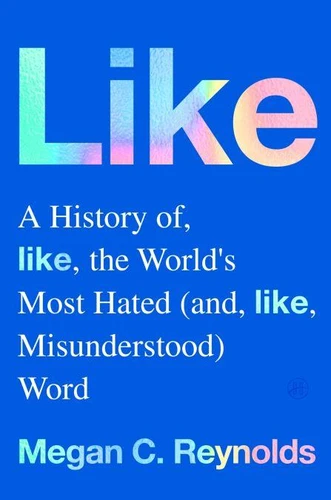Nouveauté
Like. A History of the World's Most Hated (and Misunderstood) Word
Par :Formats :
Disponible dans votre compte client Decitre ou Furet du Nord dès validation de votre commande. Le format ePub protégé est :
- Compatible avec une lecture sur My Vivlio (smartphone, tablette, ordinateur)
- Compatible avec une lecture sur liseuses Vivlio
- Pour les liseuses autres que Vivlio, vous devez utiliser le logiciel Adobe Digital Edition. Non compatible avec la lecture sur les liseuses Kindle, Remarkable et Sony
- Non compatible avec un achat hors France métropolitaine
 , qui est-ce ?
, qui est-ce ?Notre partenaire de plateforme de lecture numérique où vous retrouverez l'ensemble de vos ebooks gratuitement
Pour en savoir plus sur nos ebooks, consultez notre aide en ligne ici
- Nombre de pages256
- FormatePub
- ISBN978-0-06-341530-0
- EAN9780063415300
- Date de parution01/07/2025
- Protection num.Adobe DRM
- Infos supplémentairesepub
- ÉditeurHarperOne
Résumé
A comprehensive and thought-provoking investigation into one of the most polarizing words in the English language. Few words in the English language are as misunderstood as "like." Indeed, excessive use of this word is a surefire way to make those who pride themselves on propriety, both grammatical and otherwise, feel compelled to issue correctives. But what the detractors of this word fail to understand is its true function and versatility-as an exclamation, a filler of space, a means of subtle emphasis, and more.
"Like" may have started out as slang, but it is now an intrinsic component of fun, serious, and altogether nurturing communication. And like any colloquialism, the word endears the speaker to its audience; a conversation full of likes feels more casual, despite its content. In this book, culture writer and editor for Dwell magazine Megan C. Reynolds takes us through the unique etymology and usage of this oft-reviled word, highlighting how it is often used to undermine people who are traditionally seen as having less status in society-women, younger people, people from specific subcultures-and how, if thought about differently, it might open up a new way of communication and validation.
Written in a breezy yet informative and engaging style, this is a must-read for anyone who considers themselves a grammarian, a lover of language, and an advocate for the marginalized in discussions of cultural capital, power, and progress.
"Like" may have started out as slang, but it is now an intrinsic component of fun, serious, and altogether nurturing communication. And like any colloquialism, the word endears the speaker to its audience; a conversation full of likes feels more casual, despite its content. In this book, culture writer and editor for Dwell magazine Megan C. Reynolds takes us through the unique etymology and usage of this oft-reviled word, highlighting how it is often used to undermine people who are traditionally seen as having less status in society-women, younger people, people from specific subcultures-and how, if thought about differently, it might open up a new way of communication and validation.
Written in a breezy yet informative and engaging style, this is a must-read for anyone who considers themselves a grammarian, a lover of language, and an advocate for the marginalized in discussions of cultural capital, power, and progress.
A comprehensive and thought-provoking investigation into one of the most polarizing words in the English language. Few words in the English language are as misunderstood as "like." Indeed, excessive use of this word is a surefire way to make those who pride themselves on propriety, both grammatical and otherwise, feel compelled to issue correctives. But what the detractors of this word fail to understand is its true function and versatility-as an exclamation, a filler of space, a means of subtle emphasis, and more.
"Like" may have started out as slang, but it is now an intrinsic component of fun, serious, and altogether nurturing communication. And like any colloquialism, the word endears the speaker to its audience; a conversation full of likes feels more casual, despite its content. In this book, culture writer and editor for Dwell magazine Megan C. Reynolds takes us through the unique etymology and usage of this oft-reviled word, highlighting how it is often used to undermine people who are traditionally seen as having less status in society-women, younger people, people from specific subcultures-and how, if thought about differently, it might open up a new way of communication and validation.
Written in a breezy yet informative and engaging style, this is a must-read for anyone who considers themselves a grammarian, a lover of language, and an advocate for the marginalized in discussions of cultural capital, power, and progress.
"Like" may have started out as slang, but it is now an intrinsic component of fun, serious, and altogether nurturing communication. And like any colloquialism, the word endears the speaker to its audience; a conversation full of likes feels more casual, despite its content. In this book, culture writer and editor for Dwell magazine Megan C. Reynolds takes us through the unique etymology and usage of this oft-reviled word, highlighting how it is often used to undermine people who are traditionally seen as having less status in society-women, younger people, people from specific subcultures-and how, if thought about differently, it might open up a new way of communication and validation.
Written in a breezy yet informative and engaging style, this is a must-read for anyone who considers themselves a grammarian, a lover of language, and an advocate for the marginalized in discussions of cultural capital, power, and progress.



